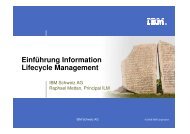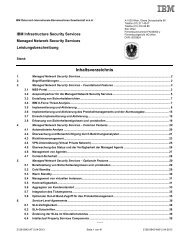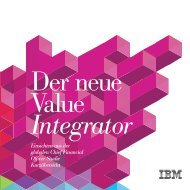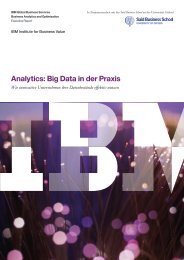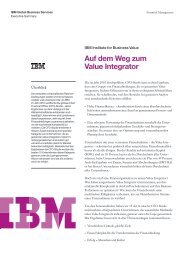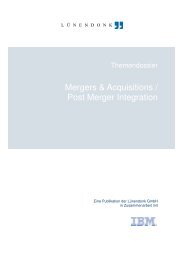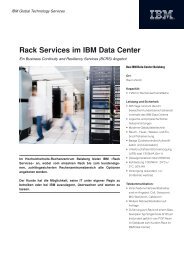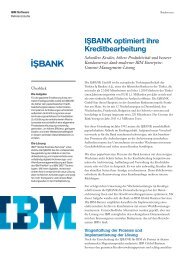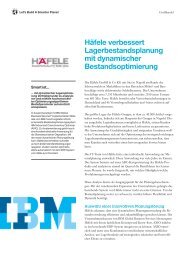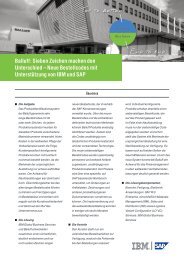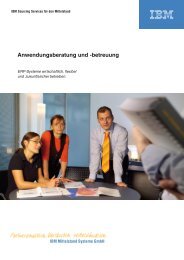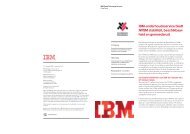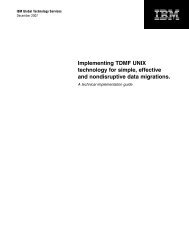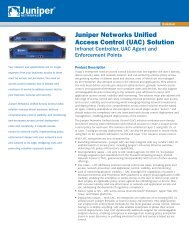Trends and Innovations Shaping the Future of Banking 2.0 - IBM
Trends and Innovations Shaping the Future of Banking 2.0 - IBM
Trends and Innovations Shaping the Future of Banking 2.0 - IBM
Create successful ePaper yourself
Turn your PDF publications into a flip-book with our unique Google optimized e-Paper software.
loan – I buy a car; I don’t get a credit card – I go<br />
shopping. The bank provides a product that enables<br />
me to do those things. The requirement for banks<br />
now is to provide this enablement in a simpler, more<br />
relevant way.<br />
A bank can’t be everywhere, so to be pervasive<br />
we must work through points <strong>of</strong> engagement where<br />
<strong>the</strong> customer needs <strong>the</strong> functionality <strong>of</strong> a ‘bank’.<br />
There is potential to have a sort <strong>of</strong> ‘intel inside’ type<br />
br<strong>and</strong>ing e.g. ‘<strong>the</strong> piggybank inside’ or ‘powered<br />
by Westpac’, but I don’t think br<strong>and</strong> domination<br />
that way is really feasible. Having a trusted br<strong>and</strong><br />
is part <strong>of</strong> <strong>the</strong> fabric <strong>of</strong> <strong>the</strong> system, but ultimately<br />
pervasiveness is more important because I will<br />
value utility <strong>and</strong> convenience as <strong>the</strong> core measure<br />
<strong>of</strong> br<strong>and</strong> performance.<br />
Take mortgaging – we ebb <strong>and</strong> flow on this.<br />
Aussie Home Loans came along in <strong>the</strong> early ’90s<br />
but now <strong>the</strong> pendulum has swung back towards <strong>the</strong><br />
mainstream banks. With modality changes <strong>the</strong>re’ll<br />
be that ebbing <strong>and</strong> flowing <strong>and</strong> <strong>the</strong>re might be<br />
an initial spurt <strong>of</strong> activity where people love new<br />
technology like Google Wallet. When <strong>the</strong> bank<br />
<strong>of</strong>fers something similar, <strong>the</strong>y might change back,<br />
but <strong>the</strong> loyalty to br<strong>and</strong> is not going to be <strong>the</strong>re.<br />
People will be opportunistic.<br />
michAel Weeding, citi: Years ago when it was<br />
assumed that online banking would replace <strong>the</strong><br />
branch, I read an article about how <strong>the</strong> branch still<br />
plays a role. Two weeks ago I read an article that<br />
stated online investments are a waste <strong>of</strong> money<br />
because everyone’s going to use mobile banking.<br />
Obviously without those platforms we can’t deliver<br />
mobile banking, but <strong>the</strong>re will be people that will<br />
think that it’s best to invest less in connecting from<br />
a computer as opposed to a mobile device. What are<br />
your thoughts on that?<br />
Brett King, Author: When internet banking<br />
started, <strong>the</strong> service essentially became a big<br />
single-point <strong>of</strong> contact branch that behaved like<br />
o<strong>the</strong>r branches but now online. Online behaviour<br />
today is more distributed <strong>and</strong> <strong>the</strong>re is aggregation,<br />
disintermediation, etc. Take <strong>the</strong> humble login or<br />
site registration process. Facebook, Twitter <strong>and</strong><br />
LinkedIn have emerged recently as <strong>the</strong> default login<br />
processes <strong>of</strong> <strong>the</strong> internet. When you register for new<br />
services now, you put in your Facebook or Twitter<br />
ID. You don’t register with a new set <strong>of</strong> login details<br />
because it’s too hard to remember all <strong>the</strong> different<br />
logins we have to manage today.<br />
Internet banking in <strong>the</strong> next three to five<br />
years will become about chunks <strong>of</strong> embedded<br />
functionality, distributed where you need <strong>the</strong>m.<br />
For example, when you go to Domain.com.au <strong>the</strong>re<br />
will be a mortgage application or your bank says<br />
you’re pre-approved for this amount based on your<br />
salary. When you go to Amazon.com <strong>and</strong> you enter<br />
your ANZ credit card, your account balance will be<br />
shown next to that card within <strong>the</strong> shopping cart.<br />
trends And innovAtions shAping <strong>the</strong> <strong>Future</strong> oF BAnKing <strong>2.0</strong><br />
There won’t be separate public banking websites<br />
<strong>and</strong> separate internet banking websites, <strong>the</strong>re<br />
will just be presence. When customers today go<br />
to a website, 90 per cent click <strong>the</strong> login button.<br />
Banks heavily invest in <strong>the</strong> public website doing<br />
expensive marketing with ‘buy our credit card’<br />
<strong>and</strong> ‘buy this mortgage’ <strong>and</strong> so on but maybe five<br />
to 10 per cent <strong>of</strong> <strong>the</strong> traffic is engaged on that<br />
site. We’re very poor at selling behind <strong>the</strong> login.<br />
We’ve got to get rid <strong>of</strong> <strong>the</strong> separation between <strong>the</strong><br />
public website <strong>and</strong> net banking. Secure elements<br />
<strong>of</strong> <strong>the</strong> site may need verification for transactions,<br />
but we don’t need two separate platforms, which<br />
is largely what we have today. The public website<br />
<strong>and</strong> net banking facilities will merge. Distributed<br />
content will become very important <strong>and</strong> might<br />
be delivered by mobile, by internet, through<br />
social media or ano<strong>the</strong>r site. It won’t matter; <strong>the</strong><br />
customer just needs that chunk <strong>of</strong> functionality<br />
based on context or a specific trigger.<br />
stephen Benton, BAnKWest: So <strong>the</strong> banks<br />
become manufacturers around a system <strong>of</strong> product<br />
commoditisation. That’s already happened to some<br />
mortgages. However, <strong>the</strong>re may be advice that you<br />
don’t want to automate or that is hard to automate.<br />
Maybe someone wants to speak directly with an<br />
advisor. Is that a role that banks could push to add<br />
value, or do you think that someone else will also do<br />
that at <strong>the</strong> front end?<br />
Brett King, Author: For some products it’s<br />
becoming harder to differentiate on a service<br />
component. Private bankers at <strong>the</strong> UK bank RBS<br />
Coutts were telling me recently that some clients<br />
were increasingly sceptical about <strong>the</strong> Bank’s<br />
capabilities because <strong>the</strong>y couldn’t do simple things<br />
like transfer money without calling a private banker.<br />
The private bank was delivering on ‘advice’ as <strong>the</strong><br />
key differentiator but <strong>the</strong>ir clients perceived that<br />
it wasn’t as capable as <strong>the</strong>ir day-to-day retail bank<br />
as <strong>the</strong>y couldn’t do everyday internet banking. You<br />
need to have <strong>the</strong> right mix <strong>of</strong> service <strong>and</strong> platform.<br />
The o<strong>the</strong>r thing is that consistency <strong>of</strong> advice is<br />
always an issue. Customers who are interested in a<br />
specific asset class, for example, will research that<br />
online for hours. They <strong>the</strong>n start firing questions at<br />
<strong>the</strong> advisor who doesn’t know <strong>the</strong> answers because<br />
he’s a generalist or product pusher. The premise<br />
in banking for a long-time was that as bankers we<br />
were <strong>the</strong> best to ‘advise’ because <strong>of</strong> information<br />
scarcity <strong>and</strong> that’s simply no longer <strong>the</strong> case. As<br />
individual investors we all have access to <strong>the</strong> same<br />
data <strong>the</strong> traders have.<br />
stephen Benton, BAnKWest: Except <strong>the</strong>y were<br />
looking at different segments.<br />
Brett King, Author: You’re right, but it’s<br />
not enough to say that <strong>the</strong> advisory role is a<br />
differentiator. It depends on <strong>the</strong> segment; it depends<br />
“Having a trusted br<strong>and</strong><br />
is part <strong>of</strong> <strong>the</strong> fabric<br />
<strong>of</strong> <strong>the</strong> system, but<br />
ultimately pervasiveness<br />
is more important<br />
because I will value<br />
utility <strong>and</strong> convenience<br />
as <strong>the</strong> core measure <strong>of</strong><br />
br<strong>and</strong> performance”<br />
– Brett King, Author<br />
3



